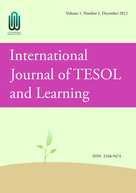


Volume 11 Issues 1-4 (2022-12-31)
Volume 10 Issues 3&4 (2021-12-31)
Volume 10 Issues 1&2 (2021-06-30)
Volume 9 Issues 3&4 (2020-12-31)
Volume 9 Issues 1&2 (2020-06-30)
Volume 7 Issues 3&4 (2018-12-31)
Volume 6 Issues 3&4 (2017-12-31)
Volume 6 Issues 1&2 (2017-06-30)
Volume 5 Issues 1&2 (2016-06-30)
The introduction of Automatic Speech Recognition (ASR) into pronunciation teaching and learning has advanced Computer-assisted Pronunciation Training (CAPT), allowing language learners to access virtually unlimited practice at the learners’ own pace, and what is even more important, to provide individualized and instantaneous feedback. This paper first examines the advantages and challenges of ASR-based feedback in CAPT. It then discusses the importance of feedback in pronunciation teaching and learning as well as the pedagogical and technological needs for effective ASR-based feedback. Following that, it investigates the pedagogical and technological issues in ASR-based feedback, focusing on L2 classroom pronunciation teaching and learning. Finally, it provides suggestions for addressing the pedagogical and technological issues in ASR-based CAPT as well as a new direction for future research and practical implementation of CAPT.
This study explores current Ontario-Canadian French-as-a-second- language (FSL) teachers' perceptions of the importance of pragmatic competence instruction and its assessment. Specifically, this study attempts to better identify: 1) if teachers impart importance to the use of pragmatic instruction; 2) current opinions about the use of pragmatic instruction; and 3) which assessment strategies best assess pragmatic competence. The researcher utilised interviews to complete this ethnographic study. Multiple cycles of coding were conducted in order to address the study's research questions. Conclusions suggest that participants find pragmatic competence instruction important to second-language acquisition. However, it is also noted that participants self-report they do not truly understand what pragmatic competence instruction is and how it is best practiced or assessed.
The purpose of this study is to provide valuable insight into the emergence of a “different self,” or the L2 self, as perceived by bilinguals when learning and speaking a second language (L2). Also, the study describes the phenomenon of a different self (L2) perceived among bilingual speakers whose L1 is Japanese and L2 is English, or vice versa, and to discover the correlation between the L2 proficiency and such a different- self phenomenon. The central claim in this study the researcher wishes to purpose is the interrelation between the cognitive developments in an L2 and the emergence of the L2 self.